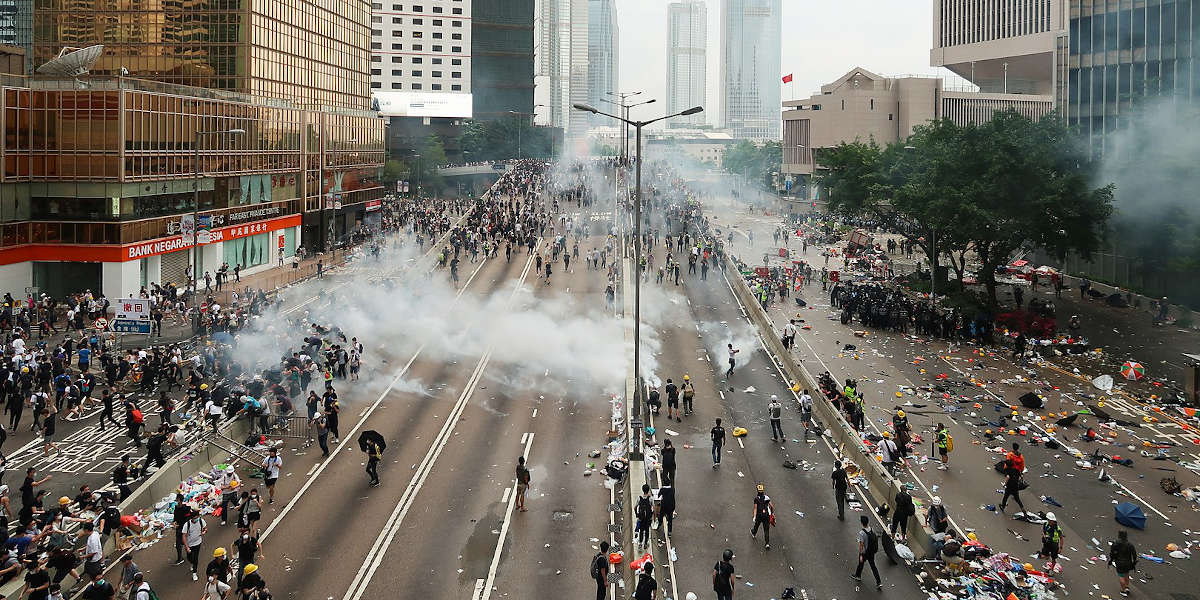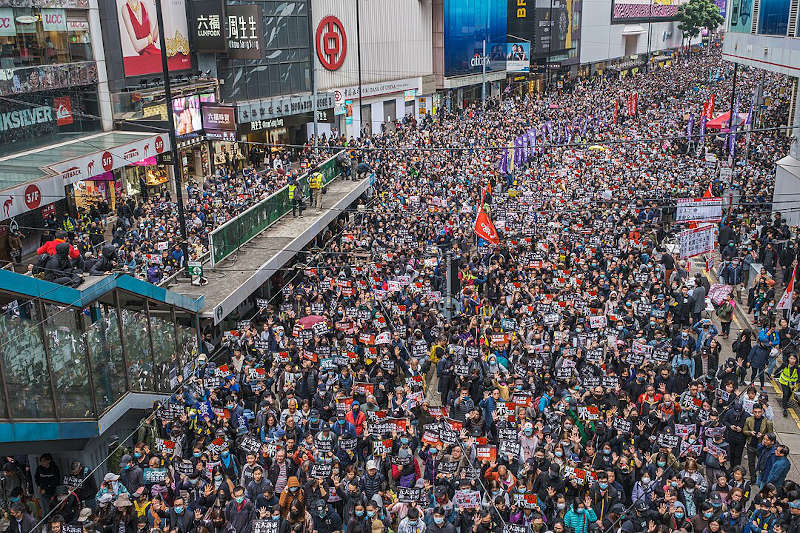En la imagen
Police used tear gas to disperse protesters gathering outside the Legislative Council Complex on 12 June 2019 [Wpcpey]
In October 2023, John Lee Ka-Chiu, Hong Kong's chief executive, announced the intention to develop Hong Kong’s own National Security Law. This law would fulfil a constitutional mandate, as Article 23 of Hong Kong Basic Law, its mini-constitution, expresses that “The Hong Kong Special Administrative Region shall enact laws on its own to prohibit any act of treason, secession, sedition, subversion against the Central People’s Government, or theft of state secrets, to prohibit foreign political organizations or bodies from conducting political activities in the Region, and to prohibit political organizations or bodies of the Region from establishing ties with foreign political organizations or bodies,” as a reflection of the “one country, two systems” regime. Although a similar law was passed by Beijing following the 2019-2020 pro-democracy riots in Hong Kong, the new law aims to cover all the offences captured in the Basic Law, but always in accordance with the definitions and penalties enshrined in Chinese law. The offences that will be defined by this law are treason, insurrection, theft of state secrets, sabotage endangering national security and external interference in domestic affairs. According to John Lee, independence advocates and foreign influence in Hong Kong’s affairs are major dangers to the region’s security.
The implementation of the law has raised several voices in the international sphere which are extremely worried about the consequences the law may bring, especially in economic and social terms. Sarah Brooks, Amnesty International’s China director, expressed that “this is potentially the most dangerous moment for human rights in Hong Kong since the introduction of the National Security Law in 2020.” In economic terms, the German commerce chamber also expressed its worries regarding the new law and the possible alignment it could bring between Hong Kong and Chinese interests.
The widespread condemnation reflects the ambiguity of the text, which could lead to a dangerous situation for the citizens of Hong Kong and the status of Hong Kong as an autonomous region.
Background
To find an explanation for the new security law that is about to be established in Hong Kong, it is necessary to look back to the colonial era of Hong Kong under British control. In 1997 the UK withdrew from the region, and it became a Special Administrative Region (SAR) of the People’s Republic of China under the “one country, two systems” order. This principle, which is also applied to Macau, means that Hong Kong can have certain autonomy in political and legal matters, while there are other areas which are reserved for Beijing. Therefore, Hong Kong had the liberty to control its citizens’ freedoms and liberties for 50 years.
Before this, in 1984, the Chinese and British governments signed the Sino-British Joint Declaration, in which both countries established the conditions and requisites for the transfer of Hong Kong to China in 1997. A few years later, in 1990, the Basic Law was enacted, governing the most institutional matters of the region, and acting as a constitution. Article 23 of the Basic Law establishes that Hong Kong has to enact laws destined to regulate some criminal matters, which are treason, secession, sedition, subversion, theft of state secrets, conduction of political activities by foreign political organizations or bodies, and the establishment of ties between political organizations of Hong Kong and foreign political organizations.
In order to comply with this legal mandate, in 2003 the government of Hong Kong announced the enactment of the laws on these criminal offences. Nonetheless, half a million Hongkongers took to the streets to protest against this political movement and the government refrained from following with the law.
Despite the freedoms and rights that were supposed to be enjoyed by the inhabitants of the enclave, rights groups constantly accused the government in Beijing of interfering in Hong Kong and its institutions, thus diminishing the autonomy and democracy there. This is why, in March 2019, after the introduction of a bill amending the Fugitive Officers Ordinance, a massive riot emerged in Hong Kong, which lasted until mid-2020 due to the COVID-19 restrictions.
The main consequence of these riots was the implementation of the National Security Law by Beijing. This law was passed to fight against what China interpreted as a serious attack on Hong Kong. The law was able to criminalise four offences which, according to Article 23, had to be regulated by the Hong Kong government. The offences covered by the National Security Law were secession, subversion, terrorism, and collusion with foreign forces. Nonetheless, the law itself established in its 7th article that Hong Kong had to complete the legislation to safeguard national security as it was stipulated in its Basic Law, as it is doing right now.
This law brought multiple criticisms and sanctions from the international sphere, as it significantly threatened the civil rights of people in Hong Kong and the autonomy of the region. Moreover, the critiques increased when, a month before the enaction of the National Security Law, the government arrested Jimmy Lai, founder of the tabloid ‘Apple Daily’, for some tweets and news defending democracy and condemning the newly imposed law. These critiques are also increasing because of the new security law for the enclave.
In 2022, Chinese President Xi Jinping expressed his aim for Hong Kong to begin developing its own law as soon as possible, and finally, in 2023 John Lee Ka Chiu announced the consultation period for the new law, which lasted from 30th January to 28th February. The final text of the law was published on 8th March.


